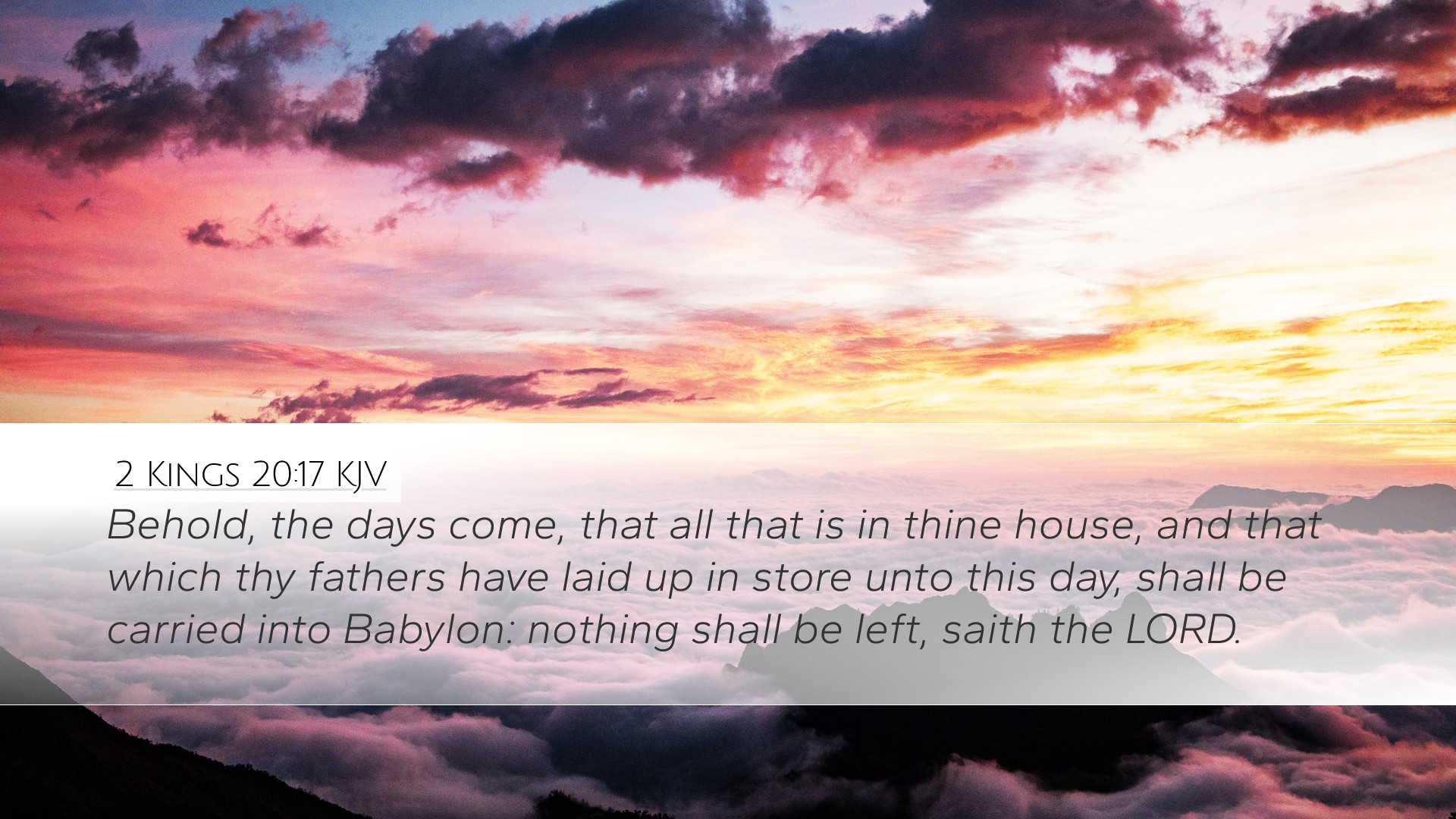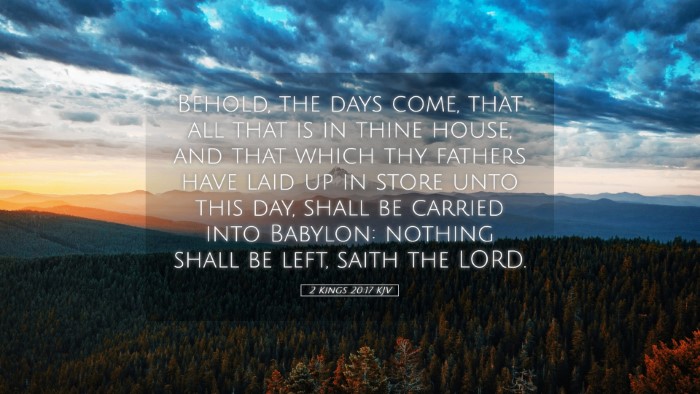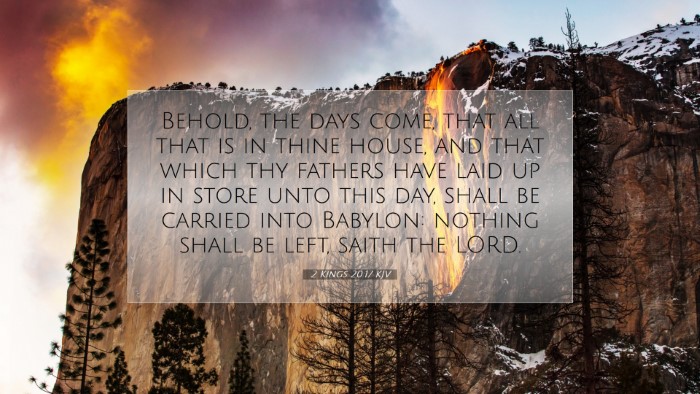Old Testament
Genesis Exodus Leviticus Numbers Deuteronomy Joshua Judges Ruth 1 Samuel 2 Samuel 1 Kings 2 Kings 1 Chronicles 2 Chronicles Ezra Nehemiah Esther Job Psalms Proverbs Ecclesiastes Song of Solomon Isaiah Jeremiah Lamentations Ezekiel Daniel Hosea Joel Amos Obadiah Jonah Micah Nahum Habakkuk Zephaniah Haggai Zechariah Malachi2 Kings 20:17
2 Kings 20:17 KJV
Behold, the days come, that all that is in thine house, and that which thy fathers have laid up in store unto this day, shall be carried into Babylon: nothing shall be left, saith the LORD.
2 Kings 20:17 Bible Commentary
Commentary on 2 Kings 20:17
2 Kings 20:17 states, "Behold, the days are coming, when all that is in your house, and what your fathers have accumulated until this day, shall be carried to Babylon; nothing shall be left," says the Lord. This verse is a pivotal moment in the narrative of King Hezekiah's life and reign, carrying significant implications for the history of Israel and Judah.
Historical Context
Hezekiah reigned during a time of great political instability and spiritual decline in Judah. In previous accounts, he is portrayed as a righteous king who brought reforms aimed at restoring worship to Yahweh. His illness and miraculous healing marked a significant episode in his life (2 Kings 20:1-7), and following this, he received envoys from Babylon, which ultimately led to prophetic warnings of impending judgment.
The Divine Message
This passage reveals God’s sovereignty and His authority to declare future events through prophetic words. The announcement of Judgment seems severe, as it foreshadows a dark reality for the people of Judah: their impending exile. Such prophetic messages are consistent with the themes found throughout the prophetic literature, where the consequences of sin, particularly against the backdrop of covenant fidelity, are highlighted.
Insights from Matthew Henry
Matthew Henry, in his commentary, emphasizes the weight of God's warning. He remarks, "This is a just and fair warning of coming calamities. The prophecy serves both as a caution against pride and a reason for genuine repentance." Henry also underscored that the treasures alluded to encompass not only material wealth but also the spiritual heritage that would be lost due to the people's disobedience. He notes that the loss of these accumulations symbolizes a greater spiritual loss as they fail to secure their covenant relationship with God.
Albert Barnes’ Insights
Albert Barnes elaborates on the nature of divine judgment, stating, "The impending captivity is a consequence of persistent idolatry and the failure to honor God as the rightful ruler." He articulates that the prophecy not only reveals the punishment but serves as a reminder for future generations about the seriousness of adhering to God’s commands. Barnes highlights the mention of Babylon, explaining that it signifies a future reality that not only includes the physical exile of the people but also the spiritual ramifications of abandoning their identity as God's chosen people.
Adam Clarke's Perspectives
Adam Clarke provides profound commentary on the phraseology and implications contained within the prophetic message. He points out that "the conveyance of all that is treasured will result in a significant loss of national identity and cultural heritage." Clarke emphasizes the historical perspective by discussing Babylon’s rise and its destiny to conquer Judah, offering a redemptive glimpse as he proposes the idea that through trials, God still aims to bring His people back to a place of relationship with Him.
Theological Reflections
- God's Sovereignty: The passage reminds readers that God is in control of history, and His plans are ultimately fulfilled, regardless of human actions.
- Covenantal Relationship: The warning serves as a stark reminder of the importance of maintaining faithfulness to God, illustrating how spiritual neglect leads to profound consequences.
- Hope Amidst Warning: While the prophecy speaks of exile, it also allows for an understanding that God’s ultimate plans include redemption and restoration.
Practical Applications
For pastors and theologians, this verse is a pivotal reference in understanding the dynamics of prophecy and accountability. It presents an opportunity to teach congregations about the importance of remaining faithful to God’s commands and the potential consequences of straying from His ways. This serves as a reminder that while God is merciful, He is also just, and the repercussions of sin can have generational effects.
Conclusion
The gravity of 2 Kings 20:17 resonates beyond its immediate context, serving as a profound warning and a significant teaching on the nature of divine judgment and mercy. As we reflect on this verse, we are reminded that the integrity of our relationship with God is paramount and that neglect may result in the loss of not only material blessings but foundational spiritual truths that uphold our covenant with Him.


